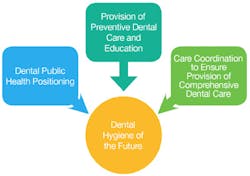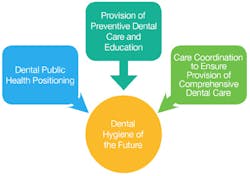Fones’ big picture
The founder of dental hygiene believed in collaboration and, yes, working outside of the dental office
Christine Nathe, RDH, MS
It is vitally important to understand the history of something when developing a solution for an issue. Dental hygienists should always research the history of topics in which they’re engaged because this can teach so much about the process and explain the “whys.”
When planning for dental public health programs, it’s important to remember the founder of dental hygiene, Dr. Alfred Fones’ initial paradigm for the profession. This paradigm focused on a new preventive dental care provider who worked outside of the dental office with the intention of motivating people to obtain comprehensive dental care by a dentist.
A photo of Dr. Fones from Fones School of Dental Hygiene, University of Bridgeport, Bridgeport, Connecticut.
Dr. Fones saw dental hygiene as a distinct profession that would be positioned within dental public health, and he believed that dental hygienists should provide education and preventive treatment outside of the dental office. Dr. Fones envisioned dental hygienists working collaboratively with other health and social service workers to provide preventive dental care to the public.
He stated that health education should be carried out by specially trained and educated teachers, and that dental hygiene was, in fact, created for this type of service.1 He further stated that because dental disease and resultant systemic infections were almost universal maladies, trained workers for maintaining mouth health were essential. The present need of the dental profession to solve the public health problem of mouth hygiene means dental hygienists should be competent to enter public schools, dental offices, infirmaries, public clinics, factories, assisted living facilities, and other institutions to care for the mouths of the millions who need these educational services.1 (Figure 1)
If dental hygiene would keep these premises at the forefront while advancing dental hygiene, Dr. Fones’ goals would be much closer to being realized, and the public would benefit from direct access to dental hygienists who provide preventive care and education. Equally important, hygienists should work as outreach workers who ensure comprehensive dental care for all. This model encompasses the essence of dental public health, which focuses on the oral health care and education of the population with an emphasis on the use of dental hygiene sciences.2
CHRISTINE NATHE, RDH, MS, is director at the University of New Mexico, Division of Dental Hygiene, in Albuquerque, N.M. She is also the author of “Dental Public Health Research” (www.pearsonhighered.com/educator), which is in its fourth edition with Pearson. She can be reached at [email protected]. or (505) 272-8147.
References
1. Fones AC. Mouth Hygiene. 4th ed. Philadelphia, PA: Lea & Febiger; 1934:329–359.
2. Nathe CN. Dental Public Health and Research, 4th edition. Upper Saddle River, NJ: Pearson, 2017.



